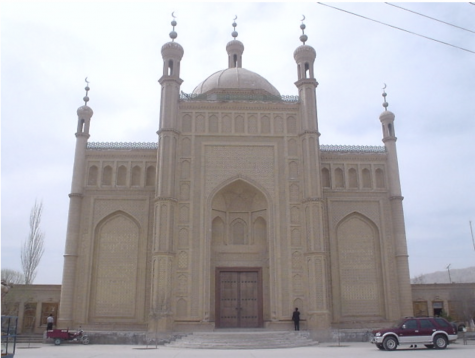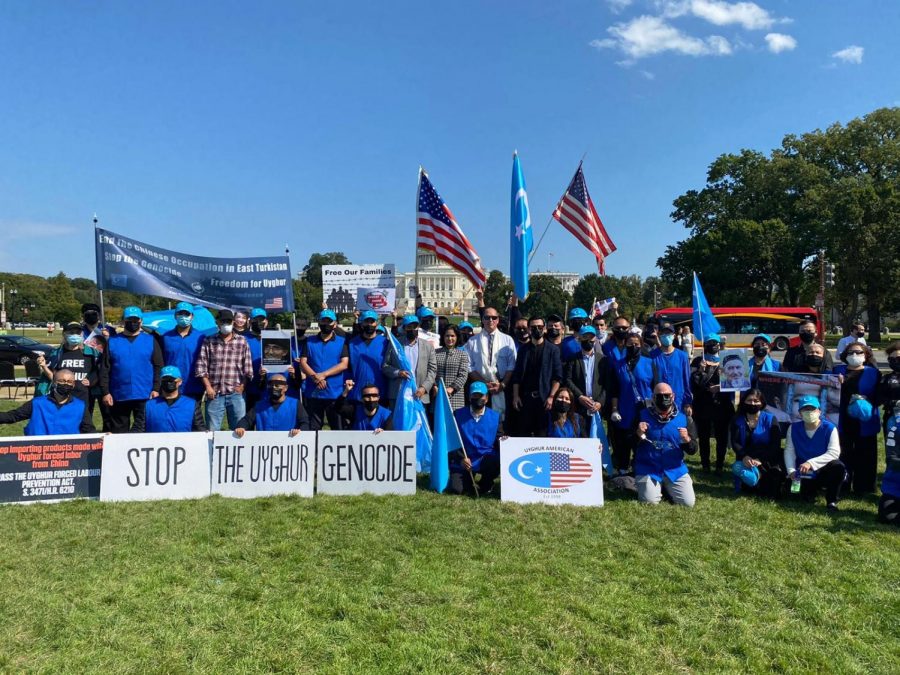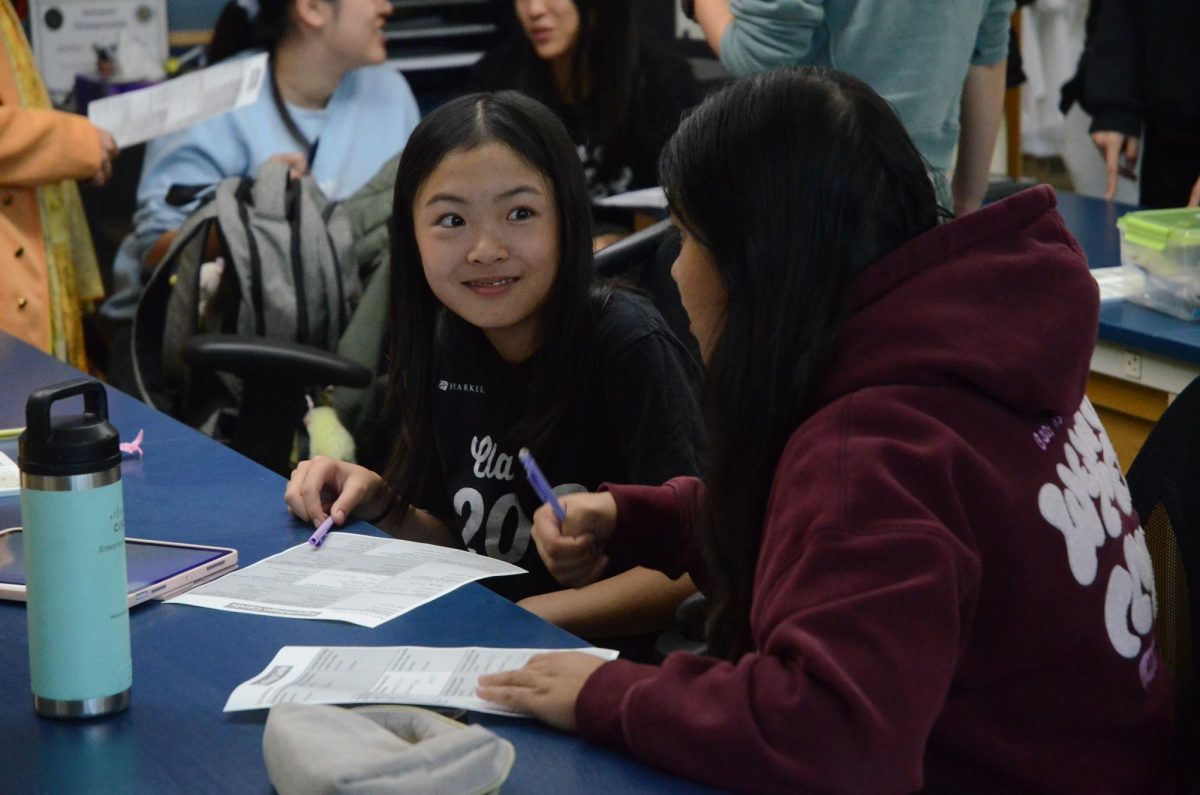“Cultural genocide”: Uyghur Muslims face oppression, internment by Chinese Communist Party
Provided by Julie Millsap, Campaign for Uyghurs
Clad in dark blue shirts, Uyghur protestors gather in Washington D.C. on Oct. 1 on the Global Day of Action. The Chinese government has detained between 1 million and 3 million Uyghurs, a Muslim Turkic minority native to the Xinjiang Uyghur Autonomous Region, also known as East Turkestan, in Northwest China, in over 380 internment camps since 2017.
October 14, 2020
Clad in matching light blue hats, the color of the East Turkestan flag, and dark blue shirts, a multitude of Uyghur protestors posed in front of the Capitol, some holding up pictures of family members taken by the Chinese government, as shown in one photo of the Global Day of Action.
The Chinese Communist Party’s (CCP) oppression of human rights provoked protests from several Asian ethnicity groups, notably Uyghurs, on Oct. 1, the founding anniversary of the People’s Republic of China.
The Chinese government has detained between 1 million and 3 million Uyghurs, a Muslim Turkic minority native to the Xinjiang Uyghur Autonomous Region, also known as East Turkestan, in Northwest China, in over 380 internment camps since 2017. While the CCP calls these camps Vocational Education and Training Centers, studies and accounts from escaped Uyghurs suggest that these camps involve forced labor.
Having too large of a family is a major reason believed to induce the Chinese government to send Uyghurs to these camps. The CCP is reported to monitor and control Uyghur fertility through pregnancy checks, even forcefully sterilizing women in some cases. Data reveals that the birth rate of the two largest Uyghur prefectures dropped by 84% between 2015 and 2018.
Moreover, Uyghurs are reported to face constant surveillance through police checkpoints and home searches. According to reports, the Chinese government is collecting DNA from the minority group as another method of tracking.
Beyond tight supervision and control, the CCP restricts the Uyghurs’ culture and identity. Authorities are reported to have banned the Uyghur language in many Xinjiang schools. In addition to prohibiting long beards and veils, the CCP is demolishing Uyghur burial grounds and building crematoria in their place.
Even Uyghurs who emigrate to America continue to face harassment from the Chinese government. For one protester at the Global Day of Action, Uyghur American activist Rushan Abbas, her sister and aunt were abducted six days after she gave a speech at the Hudson Institute think tank in September 2018.

“More than 900 miles away from each other, they both disappear exactly the same day from two different cities,” said Abbas, the founder and executive director of nonprofit Campaign for Uyghurs. “I have been writing op-eds, being very active on social media, saying that the Chinese government abducted those two innocent women as retaliation for my activism.”
Although Abbas’ aunt was released in January 2019, her sister, Dr. Gulshan Abbas, remains detained. Abbas’ story is not uncommon. Two of the Uyghur Americans interviewed in this article chose not to reveal parts of their identity, such as age or their hometown, to protect their families.
One Bay Area Uyghur American activist in his late 40s, a former council member for the Uyghur American Association who wishes to remain anonymous, said the Chinese government views the Uyghurs and other Asian minority groups as “backwards” and “barbarians.”
“The CCP’s notion is [that they’re] a civilized nation, and [they] want to make all the other rest of the uncivilized minorities civilized,” he said. “This is sort of dangerous in a way that you can directly relate to Nazi Germany, like ‘we are the chosen, we are the savior and the rest of the people we want to control and make them better.’”
Instead of racial or religious differences, Professor Dru Gladney, the Chair of Anthropology at Pomona College, said he attributes the origins of the Uyghur crisis to the influx of Han Chinese, the majority ethnic group in China, to the Xinjiang region in the 1950s. While Han Chinese made up 6% of Xinjiang’s population in comparison to the Uyghur’s 75% in 1953, Han Chinese constituted almost 41% in comparison to Uyghurs’ 45% of the Xinjiang population in 2000.
“I attribute [the tensions in the last 20 years] to mass unhindered population expansion, so it’s really about the social dynamics created by an unfettered government-supported migration of Han Chinese,” Dr. Gladney said. “The new Chinese who come in often take the best and worst jobs—the opportunities for Uyghurs have decreased significantly.”
Kaderjan Ilghar, president of the San Francisco-based nonprofit Uyghur Foundation, said the United States is one of the few countries that can stop the Uyghur plight, and if Americans do not act, the crisis will expand.
“America, being a powerful country, should stop this [crisis] because what makes America great is [its] value system,” Ilghar said. “America believes that everyone has equal opportunity. If you don’t support [stopping the crisis], one day Americans are going to go through what we’re going through.”
Upper school Mandarin teacher Dr. Shaun Jahshan said she believes that lack of information is a significant factor in the Uyghur crisis.
“People who live in China do not have access to a lot of accurate news about this situation, [and Chinese] propaganda against Islamic radicalism is fairly successful,” Dr. Jahshan said. “I would like to see the American public be more educated about Islam. There are a lot of biases even about just the group of Muslims who live in Turkistan. There’s nothing like fact and information to shine a light on problems and perhaps to find a solution.”


















![“[Building nerf blasters] became this outlet of creativity for me that hasn't been matched by anything else. The process [of] making a build complete to your desire is such a painstakingly difficult process, but I've had to learn from [the skills needed from] soldering to proper painting. There's so many different options for everything, if you think about it, it exists. The best part is [that] if it doesn't exist, you can build it yourself," Ishaan Parate said.](https://harkeraquila.com/wp-content/uploads/2022/08/DSC_8149-900x604.jpg)




![“When I came into high school, I was ready to be a follower. But DECA was a game changer for me. It helped me overcome my fear of public speaking, and it's played such a major role in who I've become today. To be able to successfully lead a chapter of 150 students, an officer team and be one of the upperclassmen I once really admired is something I'm [really] proud of,” Anvitha Tummala ('21) said.](https://harkeraquila.com/wp-content/uploads/2021/07/Screen-Shot-2021-07-25-at-9.50.05-AM-900x594.png)







![“I think getting up in the morning and having a sense of purpose [is exciting]. I think without a certain amount of drive, life is kind of obsolete and mundane, and I think having that every single day is what makes each day unique and kind of makes life exciting,” Neymika Jain (12) said.](https://harkeraquila.com/wp-content/uploads/2017/06/Screen-Shot-2017-06-03-at-4.54.16-PM.png)








![“My slogan is ‘slow feet, don’t eat, and I’m hungry.’ You need to run fast to get where you are–you aren't going to get those championships if you aren't fast,” Angel Cervantes (12) said. “I want to do well in school on my tests and in track and win championships for my team. I live by that, [and] I can do that anywhere: in the classroom or on the field.”](https://harkeraquila.com/wp-content/uploads/2018/06/DSC5146-900x601.jpg)
![“[Volleyball has] taught me how to fall correctly, and another thing it taught is that you don’t have to be the best at something to be good at it. If you just hit the ball in a smart way, then it still scores points and you’re good at it. You could be a background player and still make a much bigger impact on the team than you would think,” Anya Gert (’20) said.](https://harkeraquila.com/wp-content/uploads/2020/06/AnnaGert_JinTuan_HoHPhotoEdited-600x900.jpeg)

![“I'm not nearly there yet, but [my confidence has] definitely been getting better since I was pretty shy and timid coming into Harker my freshman year. I know that there's a lot of people that are really confident in what they do, and I really admire them. Everyone's so driven and that has really pushed me to kind of try to find my own place in high school and be more confident,” Alyssa Huang (’20) said.](https://harkeraquila.com/wp-content/uploads/2020/06/AlyssaHuang_EmilyChen_HoHPhoto-900x749.jpeg)











